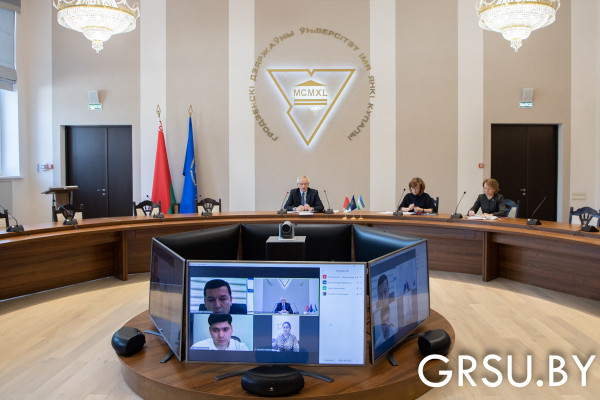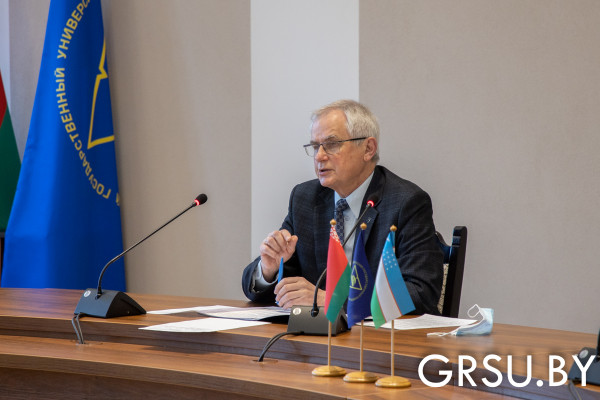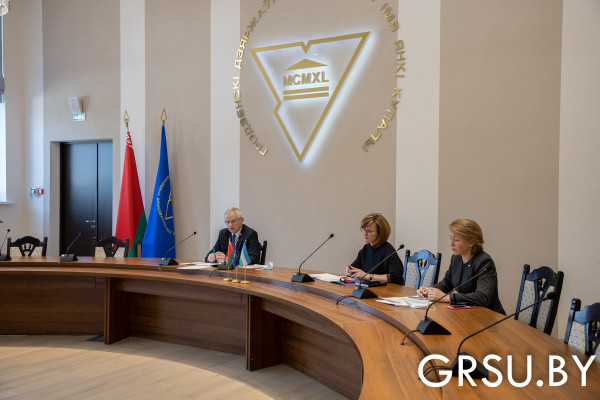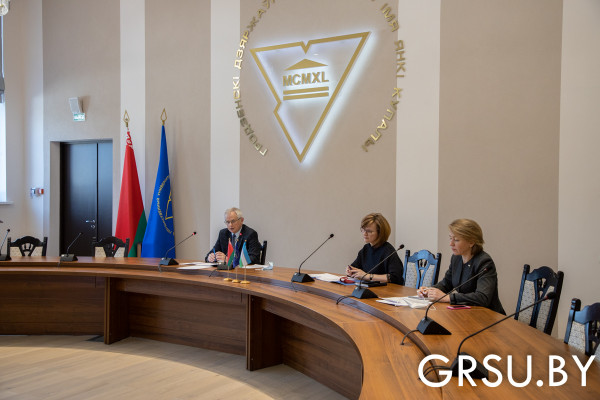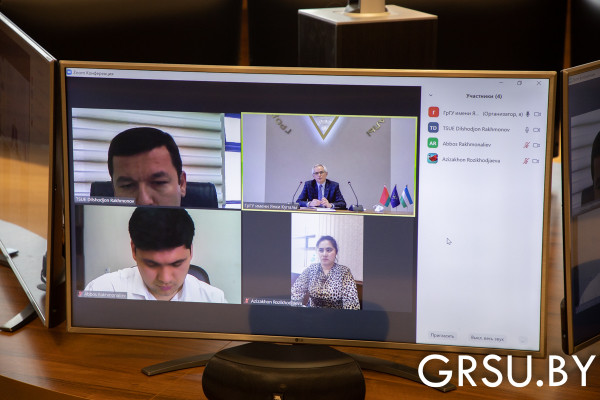
Yanka Kupala
State University of Grodno
Super User
The winners of the kettlebell lifting tournament were named at Yanka Kupala State University
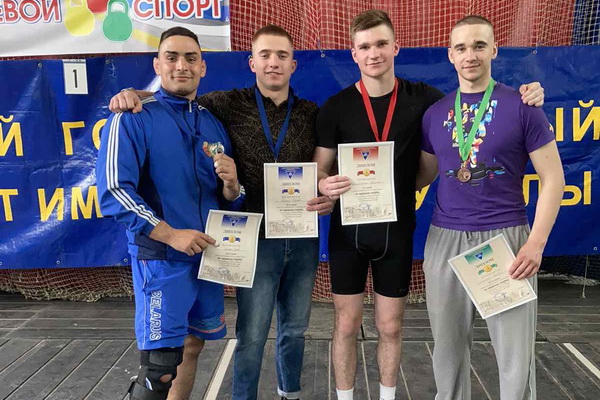
The sports competitions were timed to coincide with the 76th anniversary of the Victory in the Great Patriotic War.
The participants of the kettlebell lifting tournament performed in five weight categories, according to which the winners and prize-winners were announced. So, in the category "up to 65 kg" the first place was taken by the 2nd year student of the military faculty Sergei Chebotarenko. In second place is the 3rd year student of the Faculty of Physics and Technology Evgeny Levko, in the third place is the 1st year student of the Faculty of Physics and Technology Nikita Maskevich.
Nikita Markel, a third-year student of the military faculty, became the winner in the weight category "up to 75 kg". The representative of this faculty, the 1st year student Dmitry Lishko, also has a "silver". "Bronze" was won by the 1st year student of the Faculty of Innovative Technologies of Mechanical Engineering Artem Savochko.
The best result in the weight category "up to 85 kg" was shown by the 2nd year student of the military faculty Nikita Artishevsky. The second and third places were taken by the 2nd year students of the Faculty of Physical Education - German Kutko and Alexey Matysik, respectively.
Pavel Grisyuk, a 2nd year student of the Faculty of Civil Engineering, won in the weight category "up to 95 kg". Also, the young man was declared the absolute champion of the tournament. The second and third places in the category are taken by the 2nd year students of the military faculty Yuri Polyak and Andrey Tatarevich, respectively.
The winner in the weight category "over 95 kg" was Ilya Kuzhelevich, a 1st year student of the Faculty of Innovative Technologies of Mechanical Engineering. The second place was taken by the 2nd year student of the Faculty of Civil Engineering Kirill Yaremich.
The organizer of the open kettlebell lifting tournament was the Yanka Kupala State University of Grodno together with the primary organization of the Belarusian Republican Youth Union.
International reading competition "Love will save the world" among foreign listeners and students will be held at Yanka Kupala State University of Grodno

This year the creative competition is dedicated to the 76th anniversary of the Victory in the Great Patriotic War.
The creative competition will be held in face-to-face and distance formats. Foreign students and listeners of educational institutions of our country and foreign universities will take part in it: they will demonstrate to the competent jury their skills in Russian speech and oratory in reading poems on the topic of the competition. The jury will evaluate the correctness of the emotional and semantic interpretation, rhythm, intonation, reproduction accuracy and technique of the participants of the competition.
The competition, organized by the Department of Language Training of Belarusian and Foreign Citizens of the Faculty of Pre-University Training of Kupala University, is aimed at forming a foreign language culture of young people from different countries, revealing the creative potential of foreign listeners and students, and introducing them to world cultural values.
The final of the competition will take place on May 21 at 14.00 in the main building of the university at the address: Ozheshko, 22, aud. 218.
Employees and students of Kupala University took part in city festive events on May 9
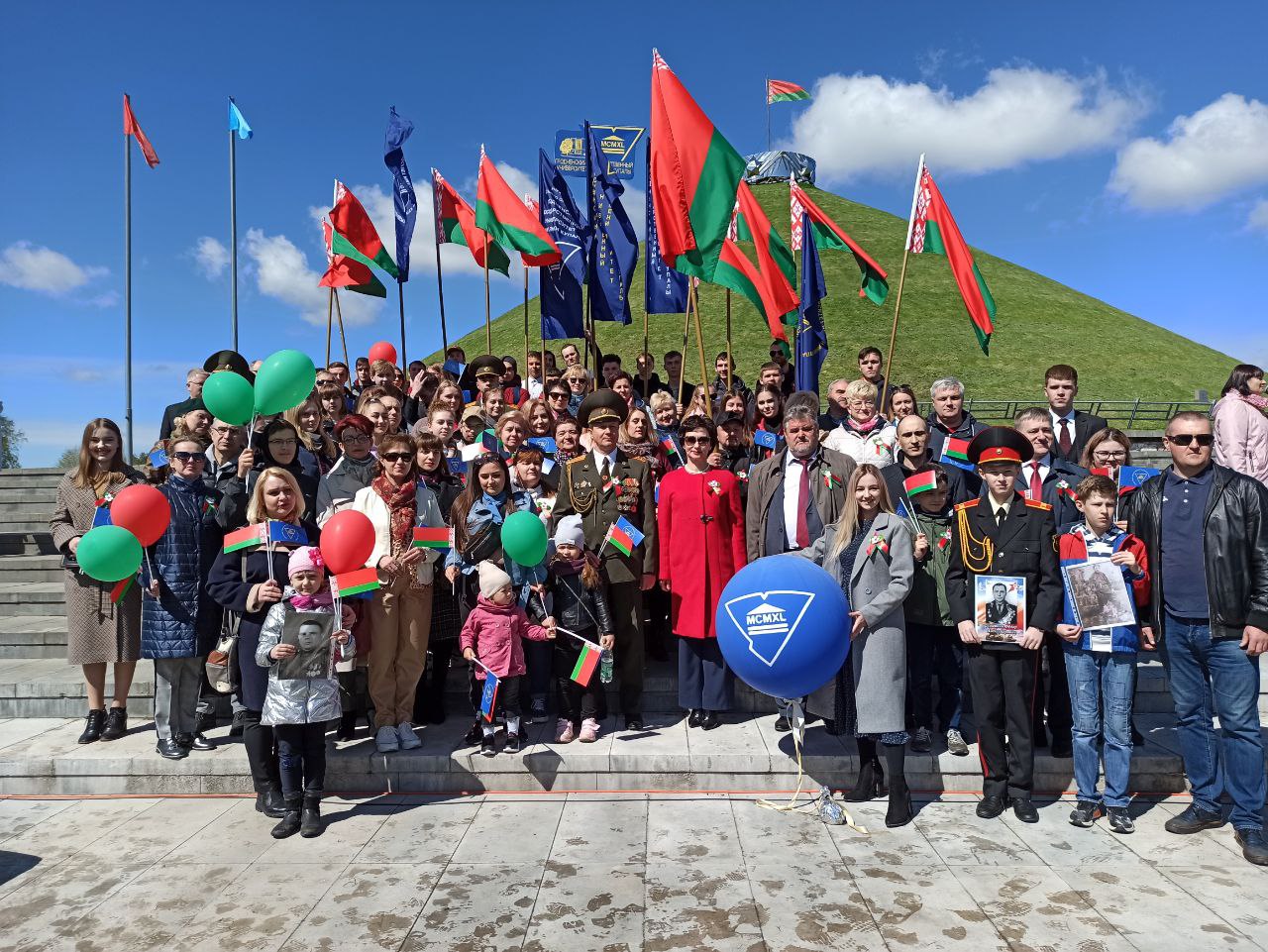
Events dedicated to Victory Day and the Day of the State Emblem and State Flag of the Republic of Belarus were held at different venues of the city and university.
In the morning, representatives of Kupala University joined the ceremony of laying flowers at the monument to the soldiers-liberators of the city of Grodno in the Zhiliber park. And then they took part in the city solemn meeting dedicated to the Victory Day, which took place at the Mound of Glory.
After the main festive events, the Kupala residents invited the participants of the holiday to join the work of their interactive platforms. Students of the pedagogical faculty, cadets of the military faculty and participants of the Yanka Kupala State University's project "Living History" deployed a thematic interactive zone "Salute, Victory!" volunteers, future teachers, conducted an entertainment program for the little participants of the holiday. The creative teams of the university also took part in a large concert program prepared for the townspeople for the Victory Day. At the same time, students of the Faculty of Arts and Design at Yanka Kupala State University of Grodno performed on the stage of the open regional festival of patriotic songs "Heart of my land". The festival was timed to coincide with the Day of the State Emblem and State Flag of the Republic of Belarus.
By the way, for this public holiday, which also fell on May 9, a separate solemn event was held at the Yanka Kupala State University. The Kupala residents gathered on the University Flag Square, and then the best students, teachers and staff, who glorify Yanka Kupala State University in the country and abroad with their achievements in education, science, sports and culture, were awarded the honorary right to carry and raise the State Flag of the Republic Belarus.
Students of Yanka Kupala State University of Grodno brought the award from the International Film Festival of Student Films in Criminology "Golden Trail"
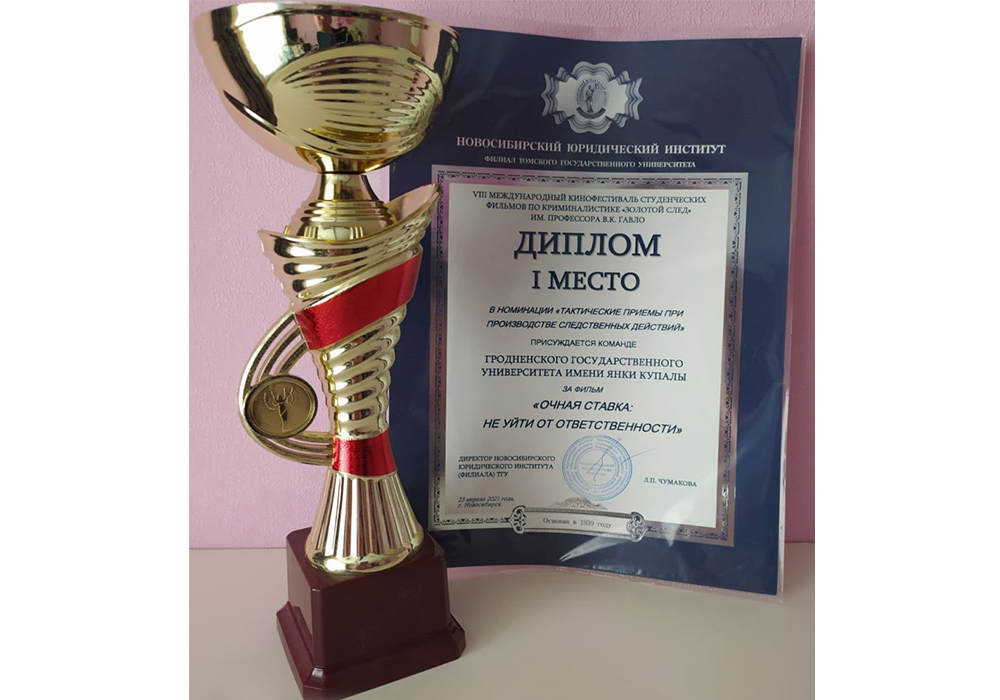
The VIII International Film Festival of Student Films in Criminology "Golden Trail" was held at the end of April at Novosibirsk Law Institute of Tomsk State University named after Professor V. K. Gavlo
In the category "Tactical techniques in the production of investigative actions", the first place was taken by the film of the Yanka Kupala Grodno State University "Confrontation:" Do not escape responsibility»
Members of the student scientific circle, as well as teachers of the Department of Criminal Law, Criminal Procedure and Criminalistics together with the educational, scientific and production association "Student Media Center" of the Yanka Kupala Grodno State University took part in the shooting of the film.
A total of 66 films took part in the festival in the "Golden Trail-2021". The jury members noted the professional level of the works presented this year. Their authors used various artistic techniques, some films were not inferior in quality to professional documentary productions. The jury of the "Golden Trail-2021" consisted of prominent scientists and practitioners in the field of criminal law, process and criminology, chaired by Doctor of Law, Professor Yury Petrovich Garmaev.
The main criteria for evaluating the films were the educational and forensic nature of the works, which is the main idea of the festival, as well as their originality, talent and skill of the cast.
Link to the movie:
https://drive.google.com/file/d/1kC21dDttpPKg3A5Qologncpk8vPCxoe8/view?usp=sharing
The winners and prize-winners in the table tennis competitions among the teams of the faculties of Yanka Kupala Stare University of Grodno were determined
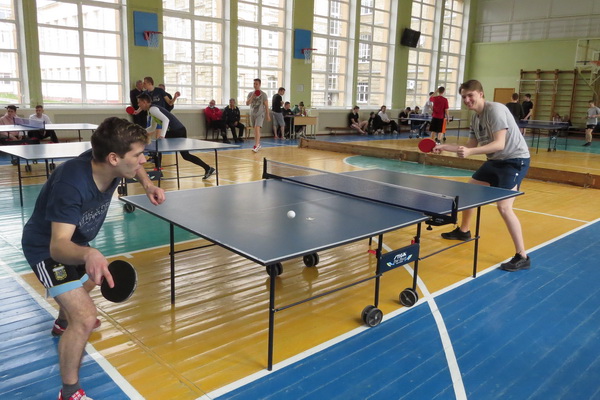
The tournaments were held on April, 27 and 28 as part of the year-round sports contest among the students of Yanka Kupala State University.
On April, 27, the girls ' table tennis competition was held. 12 teams of faculties of Yanka Kupala State University competed for the victory. As a result, the title of the winner was won by the team of girls of the Faculty of Law, the coach – senior teacher of the Department of Physical Education and Sports of the Faculty of Physical Culture Alexander Kudel. The second place was taken by the team of the Faculty of Biology and Ecology, the coach-senior lecturer of the Department of Physical Education and Sports Alexey Obelevsky. And in the third place was the team of girls of the Faculty of Mathematics and Computer Science, the coach is a senior teacher of the Department of Physical Education and Sports Alexander Flerko.
The winners and prize-winners of the table tennis tournament were also determined among young men. The competition, which took place on April, 28, was also attended by 12 teams of faculties of Kupala University. According to the results of the tournament among young men, the team of the Faculty of Civil Engineering, the coach-Associate Professor of the Department of Physical Education and Sports Vitaly Maklakov won. The second place was won by the team of the Faculty of Law, the coach-senior lecturer of the Department of Physical Education and Sports Alexander Kudel. The third place is taken by the team of young men of the Faculty of Physics and Technology, the coach is a senior teacher of the Department of Physical Education and Sports Ivan Bernatovich.
The best players of the competition were also named. Among the young men, the best players were the 1st year student of the Faculty of History, Communication and Tourism Nikolay Ermolovich, the 4th year student of the Faculty of Civil Engineering Ruslan Zantsevich and the 4th year student of the Faculty of Law Kirill Myachin. The best players among girls are Ekaterina Stanishevskaya, a 1st-year student of the Faculty of Biology and Ecology, Sofia Protosovitskaya, a 2nd-year student of the Faculty of Mathematics and Computer Science, and Victoria Ptyazhko, a 2nd-year student of the Faculty of Law.
The judging panel of the tournament was headed by Stanislav Gorodilin, Head of the Department of Theory of Physical Culture and Sports Medicine of the Faculty of Physical Culture of Yanka Kupala State University of Grodno.
Students of Kupala University won a 1st degree diploma following the results of the International Competition "Results of Theoretical Research and Practical Experiments"
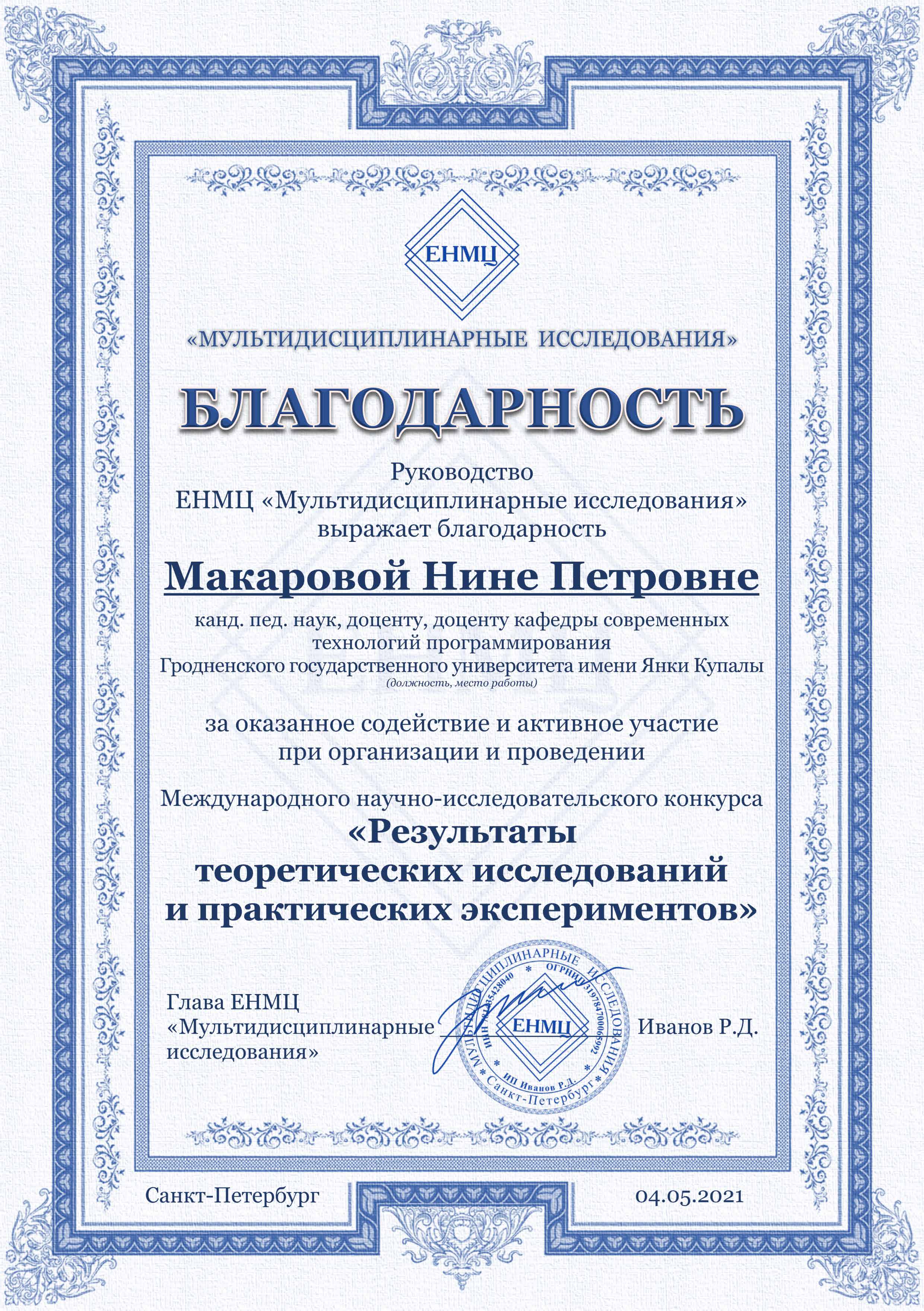
The competition was held in St. Petersburg on the basis of the Eurasian Scientific and Methodological Center "Multidisciplinary Research".
According to the results of participation in the International Research Competition "Results of Theoretical Research and Practical Experiments", 1st year students of the Faculty of Mathematics and Informatics of Yanka Kupala State University Alexey Reket and Alexey Pekarsky won a 1st degree diploma. The guys are trained in the specialty "Scientific and pedagogical activity". Within the framework of the section "Physics and Mathematics", students of Kupala University submitted for the competition the work "Experimental Investigations of Recursion". Scientific supervisor - Nina Makarova, Candidate of Pedagogical Sciences, Associate Professor, Associate Professor of the Department of Modern Programming Technologies at Yanka Kupala State University.
The collection of articles of the participants of the competition, as well as the diplomas of the winners of the I, II and III degrees, certificates of the winners of the International research competition "Results of theoretical research and practical experiments" are published on the website of the Eurasian Scientific and Methodological Center "Multidisciplinary Research".
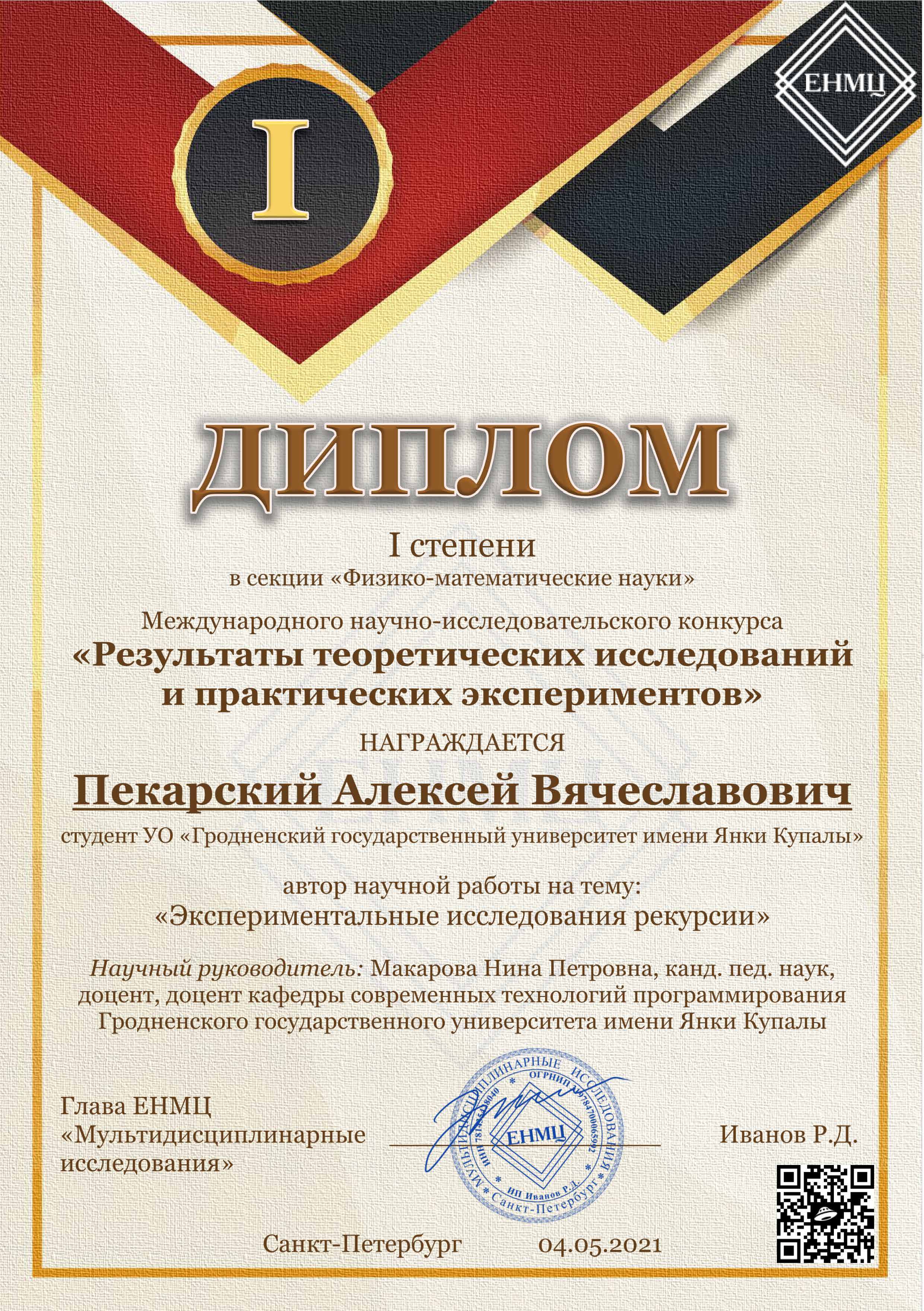
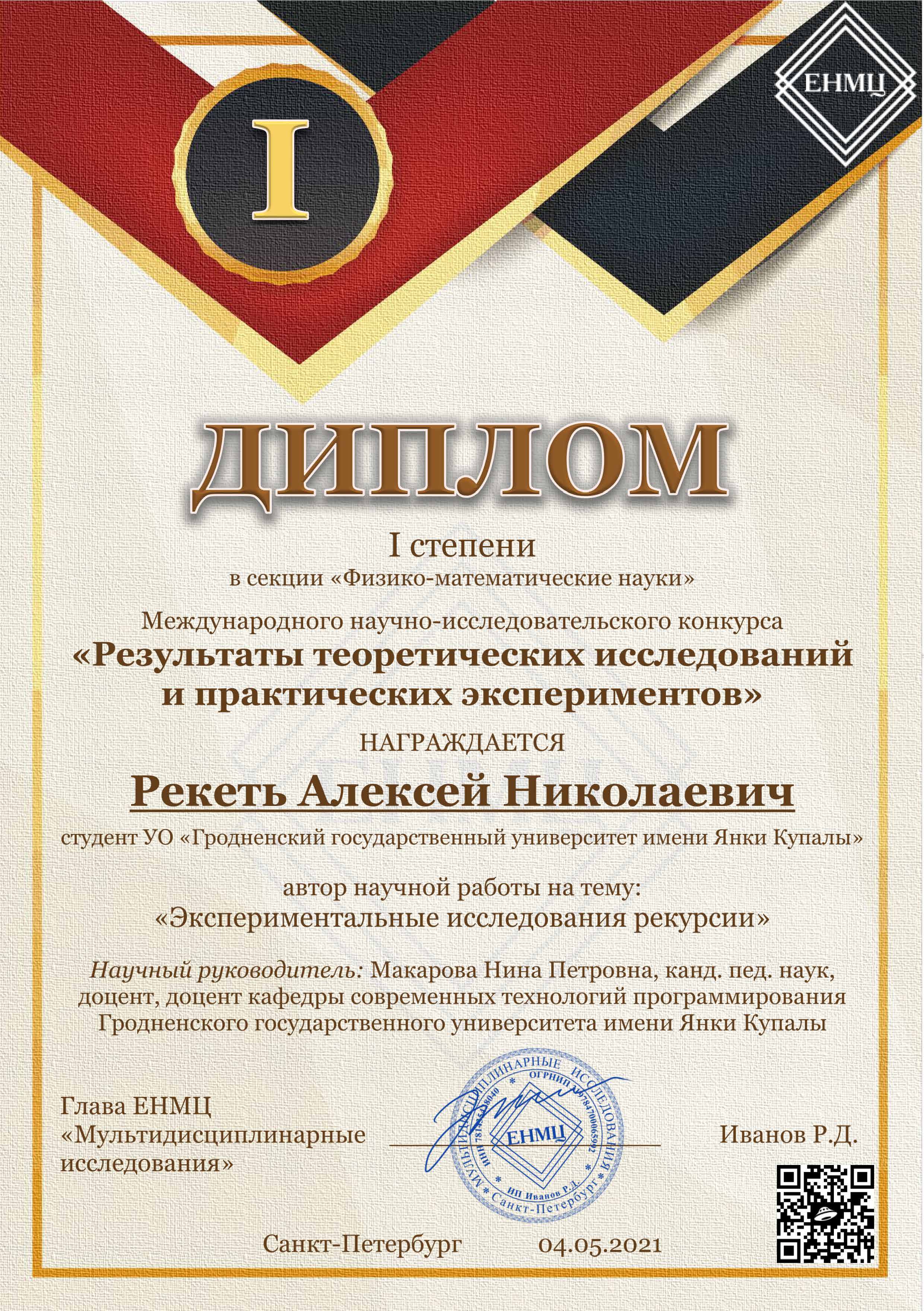
The best group of the University was determined in the Yanka Kupala State University of Grodno
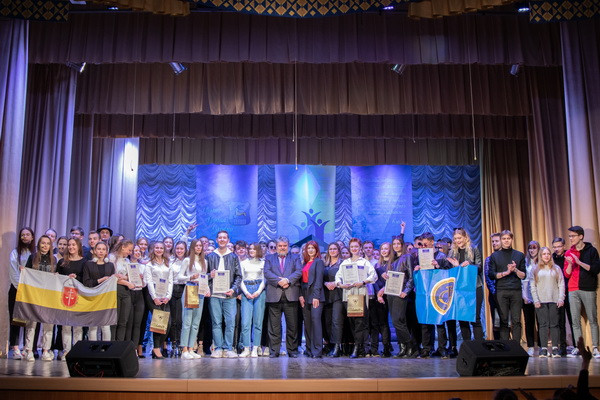
The winner of the competition "Best Group of the University – 2021" was the student group of the Faculty of History, Communication and Tourism.
This year, six student groups demonstrated their talents on the main stage: the Faculty of Physics and Technology, the Faculty of Civil Engineering, the Faculty of History, Communication and Tourism, the Faculty of Art and Design, the Faculty of Law and the Faculty of Psychology.
The creative competition was held in two stages: the students presented to the jury and the audience the portfolio "We are a Team" and the videos "Our group is the best" about their group, and the competition ended with the final performance. During the competition tests, the students talked about their numerous achievements, hobbies, rich and fun student life, sang, danced, showed theatrical performances and performances of the original genre, each performance proving their unity and creativity.
The winners of the University-wide competition "Best University Group-2021" were the 2nd year students of the specialty "Journalism "of the Faculty of History, Communication and Tourism, the second place was taken by the group of 3rd year students of the specialty" Economic Law "of the Faculty of Law, the third place was taken by the 2nd year students of the specialty" Psychology " of the Faculty of Psychology.
The 1st-year student group of the specialty "Technical operation of Power equipment of Organizations" of the Faculty of Physics and Technology won in the category "Project Debut". The diploma in the category "The most cohesive team" was deservedly won by students of the 1st year of the specialty "Industrial and Civil Construction" of the Faculty of Civil Engineering. In the category" Grace of the Project", the jury gave preference to a group of 1st-year students of the specialty "Musical Art and World Art Culture" of the Faculty of Arts and Design.
Groups of the Faculty of Law and the Faculty of Psychology received special prizes from the Trade Union Committee of Students of the University and from the NGO "BRSM" of the University. The winners of the contest were awarded with a guided tour of Belarus.
Dialogue platform “2021 - Year of National Unity. The role of youth in strengthening trust and solidarity in society, rallying the Belarusian people "was held at Yanka Kupala State University of Grodno
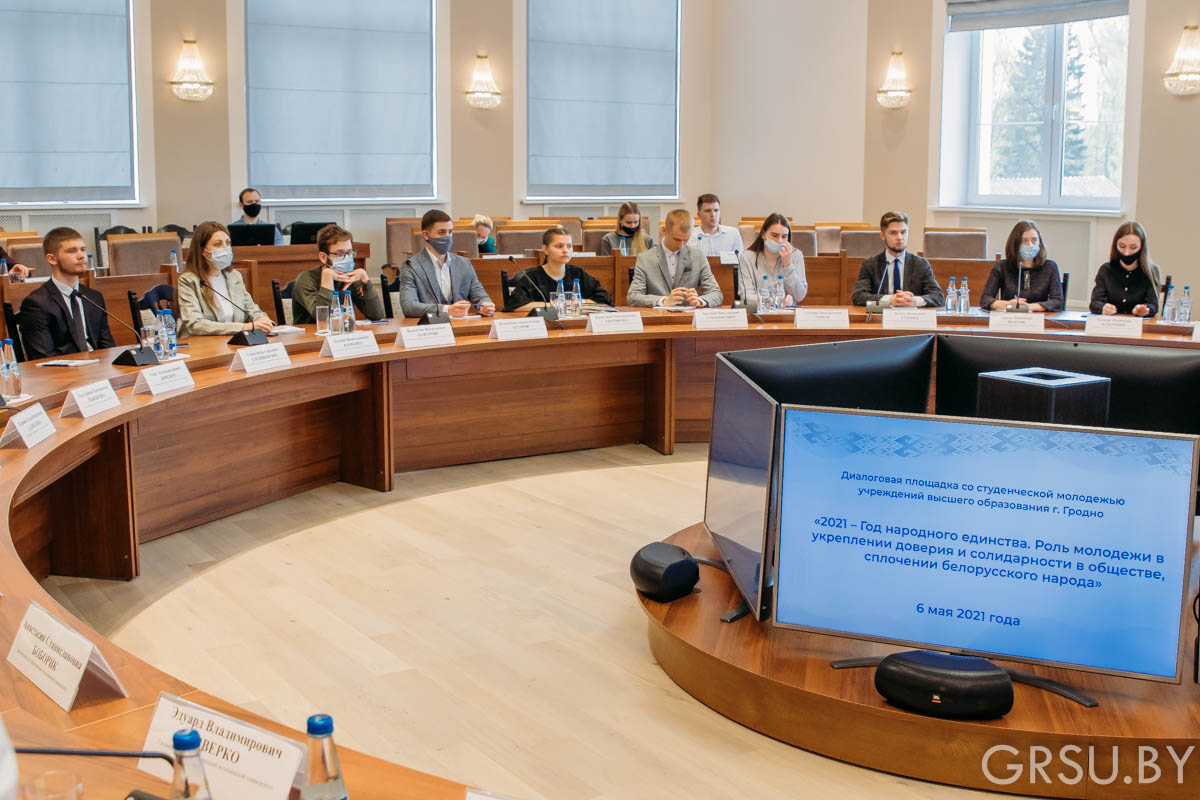
The meeting brought together representatives of the authorities and students from three institutions of higher education in Grodno - Yanka Kupala State University of Grodno, Grodno State Medical University and Grodno State Agrarian University. The event took place on May 6 within the framework of the republican project "Grodno - the youth capital".
The dialogue platform was attended by the Chairman of the Standing Committee of the Council of the Republic of the National Assembly of the Republic of Belarus on Education, Science, Culture and Social Development Viktor Liskovich, Head of the Main Department of Ideological Work and Youth Affairs of the Grodno Regional Executive Committee Igor Bulavko, Chairman of the State Control Committee of the Grodno Region Anatoly Dorozhko, as well as rectors of three universities - Rector of Yanka Kupala State University of Grodno Irina Kiturko, Rector of Grodno State Medical University Elena Krotkova and Rector of Grodno State Agrarian University Vitold Pestis. The event was moderated by a 4th year student of the Faculty of Psychology at Kupala University Veronika Basinskaya.
The main goal of the dialogue was to find answers to the questions, what is the role of youth in the formation of solidarity and trust in modern Belarusian society, what representatives of the student community can do at their level to maintain peace and stability in the country.
In his welcoming speech to the participants in the dialogue, Chairman of the Standing Committee of the Council of the Republic of the National Assembly of the Republic of Belarus on Education, Science, Culture and Social Development Viktor Liskovich noted that the future belongs to the youth and it is very important that their decisions are based on traditions, on that good experience. which was laid down and formed by their predecessors:
- Each of us has his own opinion, and this is his right, but we should in no way allow the spontaneous events that took place in August 2020. In the future, we must build such a system so that no one will have a destructive effect on the minds of our beautiful youth.
Within the framework of the discussion, the chairman of the State Control Committee of the Grodno Region Anatoly Dorozhko, who demonstrated in his life example that thanks to the care and support of the state, he received an opportunity for development and formation, noting the importance of maintaining the connection between generations and choosing a positive authority for himself in life:
- In the coming decades, you, young people, will need to take responsibility for the future of the country. It is you who will determine the ways of its development, and we will help to implement your plans.
The leaders of the student community were able to ask the representatives of the authorities the questions of concern to them, express their opinion on the ongoing processes in society. Thus, the students voiced the reasons why young people, in their opinion, are not very actively seeking to engage in research activities. Students also spoke about what, in their opinion, lies at the heart of patriotism and who a patriot is, how you can instill love for your country, for domestic producers and domestic products. We talked about improving the work of state media, their important role in covering current events, including problematic issues and ways to solve them.
The dialogue has become useful for both parties - government officials and student activists. The youth heard the position of experienced leaders, and they, in turn, assessed what was happening from the lips of the student leaders.
Rector of Tashkent Institute of Chemical Technology Botir Usmonov visited Yanka Kupala State University of Grodno
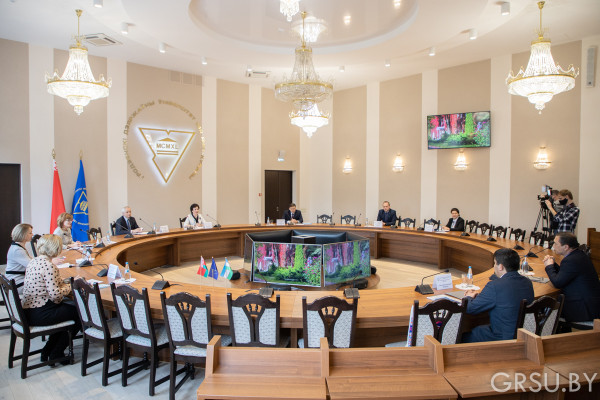
During the visit, which took place on April, 28, the prospects of cooperation in the implementation of joint educational programs were discussed.
The visit of the leadership of Tashkent Institute of Chemical Technology to Yanka Kupala State University of Grodno took place less than two months after the conclusion of the agreement on cooperation between the universities. The document was signed on March 4, 2021 during the visit of the Belarusian delegation to the Republic of Uzbekistan, which included Yanka Kupala State University of Grodno represented by Vice-Rector for Academic Affairs Yury Bialykh. At that time, preliminary agreements were reached on conducting joint scientific research in areas of mutual interest, on designing and implementing joint educational programs, on organizing and conducting internships for teachers and students of Tashkent Institute of Chemical Technology at Yanka Kupala State University of Grodno.
The discussion of the agreements already reached continued during the visit of partners from Uzbekistan to Yanka Kupala State University of Grodno. The small delegation that visited Yanka Kupala State University of Grodno included Rector of Tashkent Institute of Chemical Technology, Botir Usmonov, and Head of the Department of Double Diplomas, Anvar Shernaev. Botir Usmonov drew attention to the fact that in Uzbekistan in recent years, much attention has been paid to the field of education. At the same time, he emphasized his interest in getting a closer look at the achievements of Yanka Kupala State University of Grodno in the field of education and science.
– We are interested in your experience, - Botir Usmonov said. – Therefore, we strive to build good relations, establish mutually beneficial cooperation with universities of the Republic of Belarus, because the scientific potential of your country is very high. At the same time, we have similar sectors of economy. And our countries cooperate at the highest level in various areas – chemical industry, mechanical engineering, food, humanitarian sphere, culture. I am sure that academic mobility, exchange of teachers, and methodological support will be useful for the two states.
Irina Kiturko, Rector of Yanka Kupala State University, also agreed that cooperation with Uzbekistan is becoming a strategic and priority direction for Belarusian educational institutions.
"We already have some experience of cooperation with universities in Uzbekistan," Irina Kiturko shared. – The first cooperation agreement was signed with Tashkent University of Transport back in 2009. To date, there are already 8 such contracts. I would like to note that 4 of them were concluded last year. As for the vectors of cooperation, they are very broad. First of all, these are academic mobility programs for students and for university staff. This is the "Visiting Professor" program; this is joint training of specialists, joint educational programs.
Irina Kiturko also noted that at the moment, Yanka Kupala State University is implementing joint educational programs for training specialists with higher education of the first stage with Tashkent State Law University in the specialty "International Law", as well as with Karshi State University in the specialty "Applied Mathematics". An agreement is being developed on joint educational programs for training specialists with higher education of the first stage with the Kokand State Pedagogical Institute named after Mukimiy in four specialties: "Applied Mathematics", "Bioecology", "Psychology" and "Fine Arts and Computer Graphics".
Promising areas of cooperation with Tashkent State University of Economics were discussed at Yanka Kupala State University
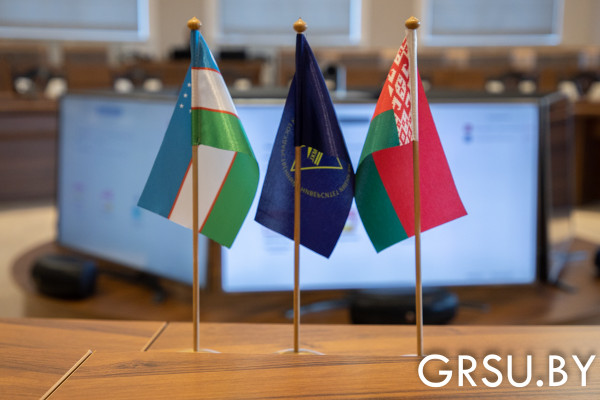
The meeting of representatives of the two universities took place online on April 26.
At the beginning of the event, Vice-Rector for Academic Affairs of Yanka Kupala State University of Grodno Yury Bialykh greeted colleagues from Uzbekistan and told about YKSUG in a presentation format. Then the main directions of international activities of Tashkent State University of Economics were presented by Vice-Rector for International Cooperation Dilshod Rakhmonov. The participants of the videoconference discussed the possibility of exchanging staff and students for undergoing study and internships, as well as for giving lectures as part of the «Visiting Professor» program. The exchange of students for training and participation in specialized summer schools was also discussed. The participants agreed to get acquainted with the curriculum in economic and tourism specialties in the near future to work out mutually beneficial areas of cooperation.
Following the results of further joint work, the representatives of both sides have planned to sign a cooperation agreement between Yanka Kupala State University of Grodno and Tashkent State University of Economics.
Reference Information: About 10 thousand students study at Tashkent State University of Economics at five faculties - economics, international tourism, corporate governance, accounting and audit, information systems in economics. Among the university employees there are 656 Professors, 10 Doctors of Science. Tashkent State University of Economics has more than 100 international agreements and actively cooperates with higher educational institutions from more than 30 countries of the world. It also conducts a joint double degree program with Turku University of Applied Sciences, Finland.


